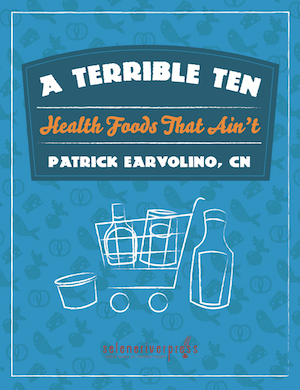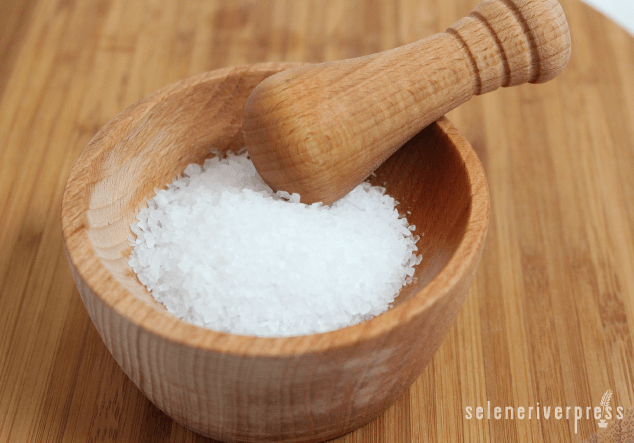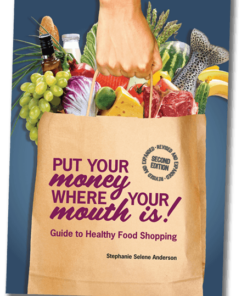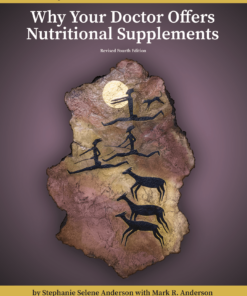“There is no doubt that, living artificially as men do, salt is an essential item in their diet. Men have longed for it and enjoyed it since prehistoric times, and they have always consumed it when they could get it—and, as suggested, not only men but beasts.”
—E.R. Yarham
Salt. Another food that our friends in science, medicine, and the government have spent a great treasure’s worth of taxpayer money to study and make declarations upon—only to change their minds and continue to study inconclusively. You can read all about it in the latest chapter of the saga: “More scientists doubt salt is as bad for you as the government says.”
But once again, they’re asking the wrong question: how much is too much? Even after so many studies and detailed examinations, the research still focuses almost exclusively on what amount of salt is healthy for humans to consume.
The failure of this line of inquiry is that you can’t decide how much of anything is healthy to consume until you ask the right questions first: What form of it is correct to consume? And what role does it play in body chemistry? This is important to know because the role that any food or substance plays in our body involves how it interacts with other chemicals. For instance, salt’s antagonist is potassium. They both perform many of the same functions, including muscle contraction and fluid balance. However, they usually do so in an opposing manner: Sodium draws fluid out of cells, increasing blood pressure. Potassium draws fluid into cells, decreasing blood pressure. Sodium intake also affects potassium excretion from the body, just as potassium intake affects sodium excretion. When we increase our intake of one, we increase excretion of the other.
“Sodium chloride is an essential constituent of the body fluids. We cannot eliminate water by osmotic transfers—we cannot perspire, our kidneys cannot eliminate waste materials and poisons—without the help of salt. Therefore, it is important that we use it in the best form. However, it must not be allowed to take the place of potassium, which is the more important mineral from a physiological viewpoint…Organic, low-heat processed sea salt should be the salt seasoning for your foods, used in amounts that are compatible with the taste and, for individuals ordinarily considered healthy, need not be restricted as to amount. Do not forget that the body cannot make something out of nothing, and the human body needs sodium and potassium for its normal functioning.”
—Dr. Royal Lee
So why is it that you rarely read a government decree on salt consumption that includes its relationship to potassium?
There’s another flaw in the conclusions that have been drawn about salt consumption. They overlook why Americans consume such high levels of it. The answer is processed food, junk food, and overconsumption of fast food. These foods contain many hidden chemicals that can’t be good for our blood pressure or any other of our physiological functions—even if we don’t go near a shaker of salt.
We need a dash of reality on our salt. And we’ll get it when we finally ask better questions. How, for instance, can you single out salt and its effect on health even as so many people are still ingesting so many other chemicals in their diets? Refined sugar, synthetic flavors, chemical tenderizers, to name but a few. And all of them can have an effect on our blood pressure, directly or indirectly. Given this reality, where are the government and private funds to study BHT, high fructose corn syrup, and yellow dye #1? What about propylene glycol alginate (E405) and polysorbate 60? Why are there no government decrees on the dangers of these and the other 3,000-plus manmade chemicals currently in our food supply? Given these dangers, warnings should be raining down on us in a meteoric shower.
And what form of salt are they studying—the refined, chemically processed commercial product or organic sea salt?
About Salt: Real Food vs. Processed Food
What is salt? In the face of such blinding salt storms of information and misinformation, get your bearings by getting informed.
Sea salt is salt that comes from seawater. When sun-dried in clay-lined vats, it’s a light grey color, high in moisture and trace minerals. When consumed, the natural iodine from marine life remaining in the dried salt will stay in our body fluids for weeks.
Refined, iodized salt, on the other hand, is a processed food. The iodine from iodized salt passes out of the body very quickly. Consuming large amounts of refined, iodized salt can even result in tissue sodium starvation.
Salt is a great example of the difference between a whole food and a processed food. The process of refining salt involves chemical and high-heat methods that remove valuable magnesium salts and trace minerals. Then, to keep the salt dry, refiners rely on toxic additives such as aluminum compounds. Next, they replace the natural iodine in salt with potentially toxic amounts of potassium iodide.
But now they must stabilize the volatile iodide compound! How? The processors add dextrose, a type of sugar. This turns the salt a purplish color, which creates yet another step in the whole sad process: bleaching.
What started out as a healthy, natural food is now a toxic chemical compound. To make matters worse, large amounts of this chemical compound are added to almost all processed foods to make them taste better. As we consume this toxin over the course of our lives, the results can be deadly.
What exactly is so different between sea salt, a whole food, and commercial iodized salt, a processed food? The very makeup of human cellular fluid is very similar to seawater, which contains a complex combination of minerals and elements—just like human cells. In fact, real food always contains a complex combination of minerals, vitamins, enzymes, and cofactors. The same cannot be said of any processed food.
To sell the stripped, mutated product called iodized salt as a food is fraudulent, just as it’s fraudulent to sell any food stripped of its nutrients. Refined food is an altered form of food that poisons the body while starving it of nutrition. Real food does just the opposite. Real food—including high-quality, unrefined sea salt—is absolutely essential for human health.
So when you eat salt—and you should!—eat healthy, organic, sea salt. It’s worth it to get high-quality sea salt from companies such as Selina Naturally and balance it with potassium by eating healthy, pastured, grass-fed, organic meat, or the highest quality meat available.
The government can keep making recommendations, and the scientists can keep putting out studies, but one thing will never change: we can’t live without salt.
 Get self-health education, nutrition resources, and a FREE copy of A Terrible Ten: Health Foods That Ain't ebook.
Get self-health education, nutrition resources, and a FREE copy of A Terrible Ten: Health Foods That Ain't ebook.



Beautifully written Stephanie, thank you! Salt that is the Real Thing is our Friend.
Thanks, Mary Jane. Have you used Himalyan pink salt? It’s amazing for neti pot and eye wash use, and lots more: himalayancrystalsalt.com
To add to your argument that we need salt in our diet, you should be aware that we cannot make hydrochloric acid to digest our food without the chloride part of the salt and it is the only food source of chloride. The sodium part of the salt is used in our body to manufacture some of the enzymes that are also needed in digestion.